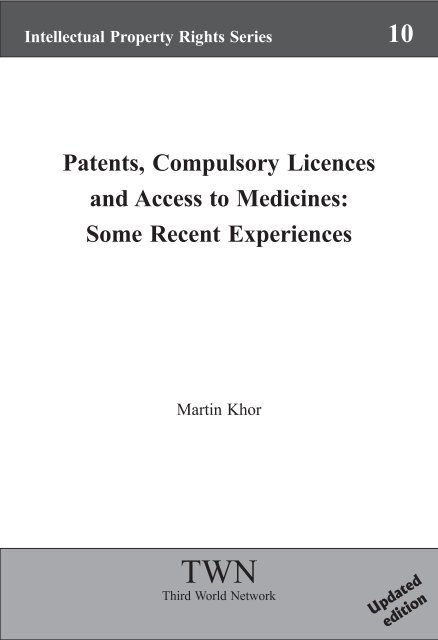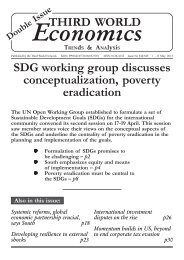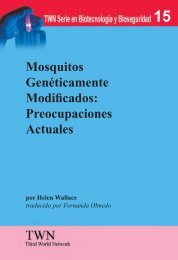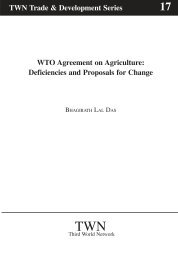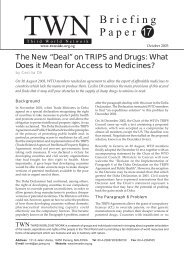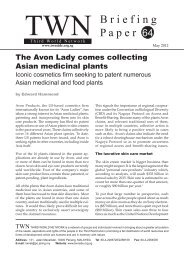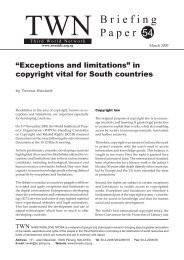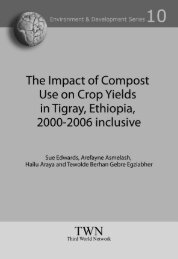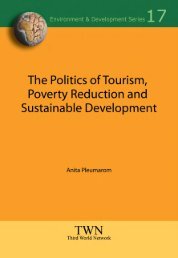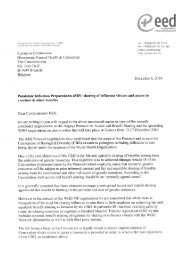Patents, Compulsory Licences and Access to Medicines: Some ...
Patents, Compulsory Licences and Access to Medicines: Some ...
Patents, Compulsory Licences and Access to Medicines: Some ...
Create successful ePaper yourself
Turn your PDF publications into a flip-book with our unique Google optimized e-Paper software.
Intellectual Property Rights Series 10<br />
<strong>Patents</strong>, <strong>Compulsory</strong> <strong>Licences</strong><br />
<strong>and</strong> <strong>Access</strong> <strong>to</strong> <strong>Medicines</strong>:<br />
<strong>Some</strong> Recent Experiences<br />
Martin Khor<br />
TWN<br />
Third World Network<br />
1<br />
Updated<br />
edition
<strong>Patents</strong>, <strong>Compulsory</strong> <strong>Licences</strong> <strong>and</strong> <strong>Access</strong> <strong>to</strong><br />
<strong>Medicines</strong>: <strong>Some</strong> Recent Experiences<br />
Martin Khor<br />
TWN<br />
Third World Network
<strong>Patents</strong>, <strong>Compulsory</strong> <strong>Licences</strong> <strong>and</strong> <strong>Access</strong> <strong>to</strong> <strong>Medicines</strong>:<br />
<strong>Some</strong> Recent Experiences<br />
is published by<br />
Third World Network<br />
131 Jalan Macalister<br />
10400 Penang, Malaysia.<br />
Website: www.twnside.org.sg<br />
© Third World Network 2007<br />
First edition: 2007<br />
Second edition (updated): 2009<br />
Printed by Jutaprint<br />
2 Solok Sungei Pinang 3, Sg. Pinang<br />
11600 Penang, Malaysia<br />
ISBN: 978-967-5412-04-2
CONTENTS<br />
1 Background 1<br />
2 National Public Health Measures that are<br />
TRIPS-Consistent 3<br />
Importing the Drug 3<br />
Local Manufacture 4<br />
Export, Including <strong>to</strong> Countries with Inadequate Manufacturing<br />
Capacity 4<br />
Conclusion 5<br />
3Use of TRIPS Flexibilities: <strong>Some</strong> Recent Experiences 6<br />
Malaysia 7<br />
Indonesia 9<br />
Thail<strong>and</strong> 11<br />
Zimbabwe 14<br />
Ghana 14<br />
Brazil 15<br />
United States 16<br />
Italy 17<br />
4 Implications of Bilateral FTAs on Implementation<br />
of TRIPS Flexibilities Regarding Public Health 19<br />
Increasing Awareness of IPR Problems in Multilateral Context 19<br />
Dangers of Bilateral FTAs in Eroding TRIPS Flexibilities 20<br />
Thail<strong>and</strong>’s Human Rights Commission Report 21<br />
Appendix:<br />
<strong>Some</strong> Recent Cases of <strong>Compulsory</strong> Licensing 24<br />
Bibliography 25
Acknowledgements<br />
This is an edited version of a paper presented at the Prince Mahidol Award Conference<br />
2007 on “Improving <strong>Access</strong> <strong>to</strong> Essential Health Technologies: Focusing on<br />
Neglected Diseases, Reaching Neglected Populations”. The conference was jointly<br />
hosted by the Prince Mahidol Award Foundation, the Thai Ministry of Public Health,<br />
the World Health Organization, Mahidol University <strong>and</strong> the Faculty of Medicine,<br />
Siriraj Hospital, <strong>and</strong> was held in Bangkok, Thail<strong>and</strong> on 1-2 February 2007.<br />
The paper draws from various other documents. Chapters 1 <strong>and</strong> 2 draw on Khor<br />
(2004). The framework <strong>and</strong> parts of Chapter 3 are from Sangeeta (2007a), while<br />
material on the various country cases is drawn from Chee (2006a) for Thail<strong>and</strong>,<br />
Chee (2006b) for Malaysia, Love (2007) for Italy <strong>and</strong> the United States, Lutfiyah<br />
<strong>and</strong> Hira (2006) for Indonesia, <strong>and</strong> Sangeeta (2007b) for Brazil. Chapter 4 draws<br />
from Khor (2007) <strong>and</strong> Medecins Sans Frontieres (2004) on FTAs, <strong>and</strong> from Smith<br />
(2007) on the report of the Thai Human Rights Commission.<br />
Chee Yoke Ling updated the paper.
1<br />
Background<br />
ACCESS <strong>to</strong> medicines, which is part of the human right <strong>to</strong> health services, has<br />
emerged as a major public health issue, especially with the impact of patents on the<br />
prices of drugs. The patenting of medicines has become more prevalent after the<br />
establishment of the Trade-Related Aspects of Intellectual Property Rights (TRIPS)<br />
Agreement in the World Trade Organization (WTO) in 1995. That agreement made<br />
it compulsory for WTO member states <strong>to</strong> include medicines in their regime for<br />
product <strong>and</strong> process patents.<br />
A few years ago, there was a public outcry after public health <strong>and</strong> development<br />
organizations highlighted how the monopoly granted by patents enabled the maintenance<br />
of excessive prices of medicines for HIV/AIDS. The cost of treating a<br />
patient with patented drugs was US$10,000-15,000 a year in developed countries,<br />
whereas some producers in developing countries were able <strong>to</strong> provide generic versions<br />
for as low as US$300. The cost of generic drugs has now dropped <strong>to</strong> US$100-<br />
150. If developing countries are able <strong>to</strong> make or import these generic drugs at<br />
lower cost, that would significantly increase access <strong>to</strong> medicines.<br />
Whilst m<strong>and</strong>ating that WTO members have <strong>to</strong> allow patenting for medicines, the<br />
TRIPS Agreement does contain flexibilities. For example, if patented drugs cost<br />
<strong>to</strong>o much, the government authorities can take measures such as issuing a compulsory<br />
licence <strong>to</strong> an agency or company <strong>to</strong> manufacture or import a generic version of<br />
that patented drug, which can then be made more available <strong>to</strong> patients more cheaply.<br />
At the WTO’s Ministerial Conference in Doha in 2001, the Doha Declaration on<br />
the TRIPS Agreement <strong>and</strong> Public Health was adopted as a response <strong>to</strong> the public<br />
concerns. The Declaration reaffirmed <strong>and</strong> clarified the flexibilities available under<br />
the TRIPS Agreement, <strong>and</strong> proclaimed: “We agree that the TRIPS Agreement does<br />
not <strong>and</strong> should not prevent Members from taking measures <strong>to</strong> protect public health<br />
…. [W]e affirm that the Agreement can <strong>and</strong> should be interpreted <strong>and</strong> implemented<br />
in a manner supportive of WTO Members’ right <strong>to</strong> protect public health <strong>and</strong>, in<br />
1
particular, <strong>to</strong> promote access <strong>to</strong> medicines for all.” The Declaration spells out several<br />
flexibilities that WTO members can use <strong>to</strong> the full, such as the right <strong>to</strong> grant<br />
compulsory licences <strong>and</strong> the freedom <strong>to</strong> determine the grounds for these.<br />
Two important <strong>and</strong> influential studies that emphasize the crucial importance of<br />
TRIPS flexibilities for developing countries are:<br />
• “Integrating Intellectual Property Rights <strong>and</strong> Development Policy” – Report<br />
of the Commission on Intellectual Property Rights established by the United<br />
Kingdom (2002) 1 ; <strong>and</strong><br />
• Report of the World Health Organization (WHO) Commission on Intellectual<br />
Property Rights, Innovation <strong>and</strong> Public Health (CIPIH) (2006) 2 .<br />
The two commissions comprised international experts on intellectual property,<br />
development <strong>and</strong> public health.<br />
If the Doha Declaration is <strong>to</strong> benefit AIDS patients <strong>and</strong> those afflicted with other<br />
ailments in developing countries, these countries now have <strong>to</strong> establish appropriate<br />
provisions in their national patent legislation by using “<strong>to</strong> the full” the flexibilities<br />
in the TRIPS Agreement. They also need <strong>to</strong> formulate <strong>and</strong> implement national policies<br />
aimed at providing access <strong>to</strong> medicines for all. In doing so, they would be<br />
operationalizing, at national level, the aims of the Doha Declaration. If such laws<br />
<strong>and</strong> policies are not introduced, the gains made at international level through the<br />
Declaration will not translate in<strong>to</strong> actual benefits for patients.<br />
In other words, whilst in recent years the goal of access <strong>to</strong> medicines has been<br />
significantly pursued at the international level, action is now equally or even more<br />
important at the national level, where policy makers should focus on policy <strong>and</strong><br />
practical measures <strong>to</strong> get medicines <strong>to</strong> poor patients.<br />
1<br />
www.iprcommission.org.<br />
2<br />
www.who.int/intellectualproperty/documents/thereport/CHPublicHealthReport.pdf.<br />
2
2<br />
National Public Health Measures<br />
that are TRIPS-Consistent<br />
GOVERNMENTS can take a range of policy measures <strong>to</strong> facilitate access <strong>to</strong> affordable<br />
medicines, including the following:<br />
Importing the Drug<br />
A country can import a generic version of a patented drug by issuing a compulsory<br />
licence <strong>to</strong> a company or agency <strong>to</strong> import the drug, <strong>and</strong> the government has the<br />
freedom <strong>to</strong> determine the grounds upon which such licences are given. The imported<br />
drug can be from a country in which the drug is not patented, or in which the<br />
drug is patented (in which case the exporting country also has <strong>to</strong> issue a compulsory<br />
licence). The applicant has <strong>to</strong> firstly negotiate <strong>to</strong> obtain a voluntary licence<br />
from the patent holder (except in cases of public non-commercial use, situations of<br />
extreme urgency <strong>and</strong> national emergency) <strong>and</strong> if that fails, then a compulsory licence<br />
can be granted. Adequate compensation has <strong>to</strong> be paid <strong>to</strong> the patent holder.<br />
A generic version of the patented drug can also be imported for “public non-commercial<br />
use” by the government. Under this “government use” procedure, the prior<br />
consent of or negotiations with the patent holder are not required, but adequate<br />
compensation has <strong>to</strong> be paid. This method is suitable if the imported drug is <strong>to</strong> be<br />
used by the government.<br />
There can also be “parallel importation”, i.e., the import <strong>and</strong> resale in a country,<br />
without the consent of the patent holder, of a patented product that has been legitimately<br />
put on the market of the exporting country under a parallel patent. It is a<br />
very important <strong>to</strong>ol enabling access <strong>to</strong> affordable medicines because there are still<br />
substantial price differences for pharmaceutical products in different markets. Parallel<br />
importation is allowed under Article 6 of the TRIPS Agreement (on “exhaustion”<br />
of intellectual property (IP) rights), <strong>and</strong> the Doha Declaration affirms this by<br />
stating that each WTO member is “free <strong>to</strong> establish its own regime for such exhaustion<br />
without challenge”. There is no need for an importer <strong>to</strong> obtain a compulsory<br />
licence or <strong>to</strong> pay compensation <strong>to</strong> the patent holder.<br />
3
Local Manufacture<br />
If a drug is patented in a country, generic versions of the drug can be locally manufactured<br />
by a local company or agency that has been granted a compulsory licence.<br />
The applicant has <strong>to</strong> have negotiated with the patent holder for a voluntary<br />
licence <strong>and</strong> failed <strong>to</strong> obtain such a licence, before applying for a compulsory licence.<br />
This requirement does not apply, however, if the compulsory licence is issued<br />
on grounds of public non-commercial use, for national emergency or situations<br />
of extreme urgency, or <strong>to</strong> remedy anti-competitive practices. Compensation<br />
has <strong>to</strong> be paid.<br />
The government can also assign <strong>to</strong> a public or private agency the right <strong>to</strong> locally<br />
manufacture a patented product without the patent holder’s permission, provided it<br />
is used for a public non-commercial purpose. Compensation has <strong>to</strong> be paid.<br />
Export, Including <strong>to</strong> Countries with Inadequate Manufacturing Capacity<br />
A local producer of generic versions of patented products under a compulsory licence<br />
or government-use provision may export a portion of its output. However,<br />
Article 31(f) of the TRIPS Agreement requires that this production be “predominantly<br />
for the supply of the domestic market” <strong>and</strong> thus there is a limit <strong>to</strong> the amount<br />
that can be exported. This restriction does not apply when the compulsory licence<br />
is granted <strong>to</strong> correct anti-competitive practices.<br />
The restriction on export quantity has posed a problem for developing countries<br />
with insufficient or no drug manufacturing capacities, as they may find it difficult<br />
<strong>to</strong> import the required medicines since there is a limit <strong>to</strong> the amount the potential<br />
exporting countries can supply <strong>to</strong> them.<br />
The Doha Declaration recognized this problem could also affect access <strong>to</strong> medicines,<br />
<strong>and</strong> m<strong>and</strong>ated the WTO <strong>to</strong> find an “expeditious solution”. After lengthy negotiations,<br />
the WTO’s governing General Council in August 2003 adopted a decision<br />
on a “temporary solution” in the form of an interim waiver <strong>to</strong> the Article 31(f)<br />
restriction, such that countries producing generic versions of patented products under<br />
compulsory licence would be allowed <strong>to</strong> export the products <strong>to</strong> eligible importing<br />
countries without having <strong>to</strong> limit the exported amount.<br />
However, the decision also obliges importing <strong>and</strong> exporting countries that wish <strong>to</strong><br />
make use of the waiver <strong>to</strong> undertake several measures <strong>and</strong> fulfil several conditions.<br />
It has been pointed out by some experts <strong>and</strong> non-governmental organizations (NGOs)<br />
that these measures <strong>and</strong> conditions are difficult for the relevant companies <strong>and</strong><br />
governments <strong>to</strong> comply with.<br />
4
There are additional requirements under a “Chairperson’s Statement” linked <strong>to</strong> the<br />
decision, such as that the system should be used in good faith <strong>and</strong> not pursue a<br />
commercial policy objective, <strong>and</strong> members concerned about how the decision is<br />
implemented can bring matters for review in the WTO’s TRIPS Council.<br />
As the waiver <strong>and</strong> the conditions for its use are only an “interim solution”, the<br />
WTO has m<strong>and</strong>ated a “permanent solution” <strong>to</strong> this problem. In December 2005,<br />
the WTO General Council adopted a set of amendments <strong>to</strong> the TRIPS Agreement<br />
that was basically a reiteration of the August 2003 “interim solution”. This amendment<br />
will come in<strong>to</strong> force only when it has been ratified by a sufficient number of<br />
countries. As of June 2009, this number has not yet been reached. Thus the “interim<br />
solution” of August 2003 is still in force.<br />
Conclusion<br />
<strong>Patents</strong> can <strong>and</strong> often do affect the access of patients (especially the poor) <strong>to</strong> medicines,<br />
<strong>and</strong> the TRIPS Agreement also does affect the space available <strong>to</strong> developingcountry<br />
members of the WTO <strong>to</strong> formulate the drug patent policies of their choice.<br />
However, despite these problems, developing countries can <strong>and</strong> should take full<br />
advantage of the measures that are permitted by the TRIPS Agreement in pursuit of<br />
the goal of promoting access <strong>to</strong> medicines for all.<br />
In order <strong>to</strong> exercise their right <strong>to</strong> “use <strong>to</strong> the full” these flexibilities in the TRIPS<br />
Agreement (in the words of the Doha Declaration), developing countries can study<br />
the policy options available <strong>to</strong> them, <strong>and</strong> introduce the appropriate laws <strong>and</strong> concrete<br />
measures. In the longer term, revisions <strong>to</strong> the TRIPS Agreement may also be<br />
desirable, in order that the existing flexibilities be exp<strong>and</strong>ed <strong>to</strong> meet the needs of<br />
patients <strong>and</strong> consumers. As millions of lives are at stake, both the shorter- <strong>and</strong><br />
longer-term tasks are urgent.<br />
5
3<br />
Use of TRIPS Flexibilities: <strong>Some</strong><br />
Recent Experiences<br />
IMPLEMENTATION of the flexibilities in the TRIPS Agreement is vital if a country<br />
is <strong>to</strong> achieve the objectives <strong>and</strong> abide by the principles outlined in the Agreement.<br />
Article 7 of the Agreement unequivocally expresses the “objective” of protection<br />
<strong>and</strong> enforcement of intellectual property rights as contributing “<strong>to</strong> the promotion<br />
of technological innovation <strong>and</strong> <strong>to</strong> the transfer <strong>and</strong> dissemination of technology,<br />
<strong>to</strong> the mutual advantage of producers <strong>and</strong> users of technological knowledge<br />
<strong>and</strong> in a manner conducive <strong>to</strong> social <strong>and</strong> economic welfare, <strong>and</strong> <strong>to</strong> a balance of<br />
rights <strong>and</strong> obligations”.<br />
Article 8 (on “principles”) recognizes that IP right holders can abuse the rights<br />
granted <strong>to</strong> them <strong>and</strong>/or resort <strong>to</strong> practices which unreasonably restrain trade or adversely<br />
affect the international transfer of technology, wherein governments may<br />
need <strong>to</strong> take “appropriate measures” consistent with the TRIPS Agreement <strong>to</strong> prevent<br />
this from happening. It also recognizes that governments may “adopt measures<br />
necessary <strong>to</strong> protect public health <strong>and</strong> nutrition, <strong>and</strong> <strong>to</strong> promote the public<br />
interest in sec<strong>to</strong>rs of vital importance <strong>to</strong> their socio-economic <strong>and</strong> technological<br />
development, provided that such measures are consistent with” the TRIPS Agreement.<br />
For many years, even before the TRIPS Agreement came in<strong>to</strong> force, several developed<br />
countries have on many occasions made use of compulsory licences.<br />
In comparison, few developing countries have implemented TRIPS flexibilities.<br />
This is due <strong>to</strong> a variety of reasons, e.g., lack of awareness or underst<strong>and</strong>ing about<br />
the available flexibilities, lack of legal expertise on IP-related issues (in particular<br />
with a pro-development perspective) in government departments, inappropriate or<br />
inadequate laws on TRIPS flexibilities <strong>and</strong>, finally, pressure from developed-country<br />
governments <strong>and</strong> industry, in particular the multinational pharmaceutical industry,<br />
<strong>to</strong> not use these flexibilities.<br />
6
An example of such pressure was seen in 2001 when 39 pharmaceutical companies<br />
brought an action against the South African government for amendments it wished<br />
<strong>to</strong> make <strong>to</strong> its law (<strong>Medicines</strong> <strong>and</strong> Related Substances Control Amendment Act No.<br />
90 of 1997) <strong>to</strong> incorporate provisions on compulsory licensing <strong>and</strong> parallel importation<br />
<strong>to</strong> increase access <strong>to</strong> affordable medicines. Later the industry capitulated by<br />
withdrawing the suit after it faced severe criticisms nationally <strong>and</strong> globally.<br />
It was criticism of the effects of patents on prices which led <strong>to</strong> the adoption of the<br />
Doha Declaration in 2001. As stated above, the Declaration recognized “that the<br />
TRIPS Agreement does not <strong>and</strong> should not prevent Members from taking measures<br />
<strong>to</strong> protect public health” <strong>and</strong> affirmed that “the Agreement can <strong>and</strong> should be interpreted<br />
<strong>and</strong> implemented in a manner supportive of WTO Members’ right <strong>to</strong> protect<br />
public health <strong>and</strong>, in particular, <strong>to</strong> promote access <strong>to</strong> medicines for all”.<br />
Very importantly the Declaration reaffirmed “the right of WTO Members <strong>to</strong> use, <strong>to</strong><br />
the full, the provisions in the TRIPS Agreement, which provide flexibility for this<br />
purpose”.<br />
Since the adoption of the Doha Declaration, many more developing countries have<br />
exercised their rights <strong>and</strong> made use of the available flexibilities <strong>to</strong> access affordable<br />
medicines, despite the continuing pressure. The initial focus was on antiretroviral<br />
medicines for HIV/AIDS treatment but this has now exp<strong>and</strong>ed in<strong>to</strong> other muchneeded<br />
medicines.<br />
Below are examples of the use of TRIPS flexibilities by developing countries. The<br />
recent use of compulsory licences in the US <strong>and</strong> Italy is also highlighted.<br />
Malaysia<br />
In 2003, Malaysia became the first country in Asia following the adoption of the<br />
Doha Declaration <strong>to</strong> issue a government-use licence. The health authorities initiated<br />
the measure after considering various options (i.e., between compulsory licensing<br />
<strong>and</strong> government-use order) <strong>and</strong> after consultations with other government<br />
departments.<br />
The government-use authorization was for the import of generic versions of patented<br />
antiretrovirals or ARVs (<strong>to</strong> treat AIDS) from the Indian company Cipla for<br />
use in government hospitals <strong>and</strong> clinics.<br />
The patented ARVs were didanosine (ddI) 100 mg tablet (patent holder: Bris<strong>to</strong>l-<br />
Myers Squibb); didanosine 25 mg tablet (patent holder: Bris<strong>to</strong>l-Myers Squibb);<br />
7
Table 1<br />
Malaysia: Comparison of cost of treatment per patient per month before <strong>and</strong><br />
after import of generic ARVs under a government-use order<br />
Treatment 2001 price for 2004 price for 2004 price Percentage<br />
patented ARV patented ARV for generic ARV of cost<br />
(US$) (US$) (US$) reduction<br />
Stavudine + 261.44 197.10 45.32 83%<br />
didanosine +<br />
nevirapine<br />
Combination of 362.63 136.34 115.14 68%<br />
zidovudine <strong>and</strong><br />
lamivudine +<br />
efavirenz<br />
Source: Ministry of Health, Malaysia.<br />
zidovudine (AZT) 100 mg capsule (patent holder: GlaxoSmithKline); lamivudine<br />
150 mg + zidovudine 300 mg tablet (Combivir; patent holder: GlaxoSmithKline).<br />
The authorization, which was for a period of two years beginning 1 November<br />
2003, was obtained from the Ministry of Domestic Trade <strong>and</strong> Consumer Affairs<br />
(DTCA) for the import of AZT, ddI <strong>and</strong> Combivir.<br />
The government-use authorization was initiated by the Ministry of Health (MOH)<br />
<strong>and</strong> the licence was issued by the DTCA. In November 2002, the MOH had presented<br />
a paper <strong>to</strong> the Malaysian Cabinet with a recommendation <strong>to</strong> import generic<br />
ARV drugs, under a section in the <strong>Patents</strong> Act that allowed the Minister <strong>to</strong> exploit a<br />
patented invention where it is required by the public interest. The Cabinet approved<br />
the import on the basis of this provision.<br />
As a result of the government-use licence, the average cost of MOH treatment per<br />
patient per month dropped significantly from 2001 (before the government-use measure)<br />
<strong>to</strong> 2004, as can be seen from Table 1.<br />
For one combination of drugs (stavudine, didanosine <strong>and</strong> nevirapine), the cost of<br />
treatment per patient per month fell from US$261 (for the patented ARV) <strong>to</strong> US$45<br />
(for the generic ARV), an 83% decline. For another combination of drugs (zidovudine<br />
<strong>and</strong> lamivudine <strong>and</strong> efavirenz), the cost fell from US$363 <strong>to</strong> US$115, or a decline<br />
of 68%.<br />
8
Also as a result of the exercise of the right of government use, the patent holders<br />
dropped their own prices, leading <strong>to</strong> considerable reduction in the cost of treatment,<br />
as seen in Table 1.<br />
The much lower cost encouraged the MOH <strong>to</strong> consider free treatment for more<br />
people who needed treatment. Previously, free treatment had only been provided <strong>to</strong><br />
a few selected categories of patients. In addition, the number of patients that could<br />
be treated in government hospitals <strong>and</strong> clinics increased from 1,500 <strong>to</strong> 4,000, according<br />
<strong>to</strong> the MOH.<br />
In June 2004, the MOH began prescribing the imported generic medicines, which<br />
were distributed through government hospitals. Then Health Minister Dr Chua Soi<br />
Lek announced on 6 June 2004 that the monthly cost of treating a patient would be<br />
reduced from RM1,200 <strong>to</strong> RM200-220, after the drugs were imported from<br />
India. “With the cheaper cost, we can treat at least 4,000 HIV patients compared <strong>to</strong><br />
the present 1,500,” he said. (The Star, 7 June 2004).<br />
According <strong>to</strong> news reports, there are 59,000 people in Malaysia infected with HIV,<br />
only 6,000 have gone for follow-up treatment in government hospitals, <strong>and</strong> up <strong>to</strong> a<br />
few years ago only 1,500 of the estimated 4,000 HIV-positive people on the verge<br />
of developing full-blown AIDS were receiving treatment (Sunday Star, 4 July 2004).<br />
The MOH proposed <strong>to</strong> the patent holders a remuneration level of 4% of the value of<br />
s<strong>to</strong>cks actually delivered. As of February 2006, it was reported that the patent<br />
holders had not shown interest in claiming the offered compensation.<br />
Indonesia<br />
Indonesia became the second Asian country in the post-Doha Declaration period <strong>to</strong><br />
issue a government-use authorization. On 5 Oc<strong>to</strong>ber 2004 a Presidential Decree<br />
was issued in accordance with Article 5 of the Indonesian Government Regulation<br />
No. 27 of 2004 regarding the Mechanism of Patent Exploitation by the Government.<br />
This was in light of “the urgent need of the community in the effort <strong>to</strong> control<br />
the HIV/AIDS epidemic”.<br />
The Presidential Decree No. 83 of 2004 Regarding Exploitation of Patent by the<br />
Government on Antiretroviral Drugs empowered the Minister of Health <strong>to</strong> appoint<br />
a “pharmaceutical fac<strong>to</strong>ry” as the patent exploiter on behalf of the government,<br />
taking in<strong>to</strong> account the recommendations from the head of the National Drug <strong>and</strong><br />
Food Authority. The two ARVs in question are nevirapine (for seven years) <strong>and</strong><br />
lamivudine (for eight years) <strong>and</strong> the exploitation period covers the remaining patent<br />
protection term.<br />
9
The decree also set the “compensation fee” at 0.5% of the net selling value of the<br />
ARVs concerned <strong>to</strong> the patent holder. According <strong>to</strong> an interview with a staff member<br />
at the Indonesian Patent Direc<strong>to</strong>rate, the patent holder has not provided any<br />
comments on the release of the Presidential Decree.<br />
Production of the ARVs has resulted in cheaper ARVs in government hospitals, as<br />
seen in Table 2.<br />
Patients who need the ARVs can now get free or partly subsidized medicines from<br />
the hospital. The price per package per month for the first-line fixed dose combination<br />
(lamivudine, zidovudine <strong>and</strong> nevirapine) produced by Kimia Farma, the authorized<br />
generic manufacturer, is US$38. The government provides a subsidy of<br />
US$20 per month, so patients pay only US$18 per month per package.<br />
In comparison, the price of lamivudine produced by GlaxoSmithKline is about<br />
US$290 per 60 tablets <strong>and</strong> of nevirapine produced by Boehringer Ingelheim is<br />
US$96 per 60 tablets. Table 2 provides a summary of the relevant ARV prices<br />
compared with prices of patented equivalents in 2000 as a baseline.<br />
Table 2<br />
Indonesia: Prices of patented ARVs compared with prices of the generic version<br />
ARVs<br />
Price of patented Price of patented Price of generic ARV<br />
ARV before 2000 ARV after 2000 after government-use<br />
(per 60 tablets) (per 60 tablets) authorization<br />
(US$) (US$) (per 60 tablets)<br />
(US$)<br />
Lamivudine + 800-1,000 600 18-65*<br />
zidovudine + nevirapine<br />
Lamivudine (3TC) NA 290-330** 28<br />
Nevirapine (Viramune) NA 96 28<br />
Lamivudine + NA 400 48.60<br />
zidovudine (Combivir)<br />
Source: Lutfiyah <strong>and</strong> Hira (2006). Data obtained through interview with PT Kimia Farma, the Indonesian<br />
generic manufacturer.<br />
Note: The br<strong>and</strong>s of the patented ARVs are in brackets.<br />
* The range of subsidized <strong>and</strong> full-cost prices that patients have <strong>to</strong> pay.<br />
** The price range in different pharmacies. Indonesia does not have price control on medicines <strong>and</strong><br />
therefore pharmacies <strong>and</strong> hospitals charge different prices.<br />
10
According <strong>to</strong> the Working Group on HIV/AIDS of the Faculty of Medicine, University<br />
of Indonesia (Pokdisus), the price of patented ARVs has not decreased<br />
substantially even though the generic drugs are in the market. Almost all the PLWHA<br />
(people living with HIV/AIDS) treated under the Pokdisus programme have turned<br />
<strong>to</strong> generic drugs. Pokdisus currently provides <strong>to</strong> about 2,000 persons free generic<br />
ARVs sourced from the domestic production under the government-use decree.<br />
In early 2007, the Indonesian government issued Presidential Decree No. 6/2007<br />
on Revision of the Presidential Decree No. 83/2004 on Implementation of Patent<br />
by the Government for Anti Retroviral Drugs. This was in recognition of the need<br />
“<strong>to</strong> increase the number of ARVs whose patents are <strong>to</strong> be implemented by the<br />
government in order <strong>to</strong> enhance access <strong>to</strong> ARVs”.<br />
The decree added efavirenz <strong>to</strong> the other two ARVs listed in the previous decree.<br />
The patent holder is Merck & Co. Inc., <strong>and</strong> the duration for the patent implementation<br />
is until the patent period expires on 7 August 2013.<br />
Thail<strong>and</strong><br />
On 29 November 2006 Thail<strong>and</strong>’s Ministry of Public Health announced a five-year<br />
government-use authorization for the domestic manufacture of efavirenz. This drug<br />
is recommended by the World Health Organization for HIV/AIDS treatment <strong>and</strong> is<br />
commonly used <strong>and</strong> considered by doc<strong>to</strong>rs as one of the best components for firstline<br />
therapy because it results in fewer side-effects <strong>and</strong> is more suitable for those<br />
co-infected with other diseases such as tuberculosis or liver infections. Although<br />
the drug has been in the market for many years, it still remains very expensive.<br />
Originally developed by DuPont Pharma, the medicine is now marketed by Bris<strong>to</strong>l-<br />
Myers Squibb. However, Merck, another pharmaceutical giant, has marketing licence<br />
rights in a number of countries including Thail<strong>and</strong> <strong>and</strong> China.<br />
The government-use authorization was issued by virtue of Section 51 of Thail<strong>and</strong>’s<br />
Patent Act B.E. 2522 (as amended by the Thai Patent Act no.2 B.E. 2535 <strong>and</strong> no.3<br />
B.E. 2542), which states that any ministry, bureau or department of the government<br />
may, by themselves or through others, exercise the compulsory-licensing right “in<br />
order <strong>to</strong> carry out any service for public consumption or which is of vital importance<br />
<strong>to</strong> the defence of the country or for the preservation or realization of natural<br />
resources or the environment or <strong>to</strong> prevent or relieve a severe shortage of food,<br />
drugs or other consumption items or for any other public service”.<br />
11
The authorization grants the Government Pharmaceutical Organization (GPO) of<br />
Thail<strong>and</strong>, a government-linked pharmaceutical manufacturer, the authority <strong>to</strong> exercise<br />
the rights under the Act.<br />
A royalty fee of 0.5% of the GPO’s <strong>to</strong>tal sale value of the imported or locally<br />
produced efavirenz will be paid <strong>to</strong> the patent holder.<br />
The authorization <strong>to</strong>ok effect immediately following the announcement <strong>and</strong> the<br />
GPO is expected <strong>to</strong> start mass production of a generic version of the drug by mid-<br />
2007. In the meantime, imports of generic efavirenz from India under the same<br />
authorization will start.<br />
This importation of the generic version from India is expected <strong>to</strong> reduce the cost of<br />
the drug for treatment <strong>to</strong> US$22 per month from US$41 per month (the price of the<br />
patented product). The cost of the locally produced drug is also expected <strong>to</strong> reduce<br />
the price <strong>to</strong> about half that of Merck’s product.<br />
Minister of Public Health Dr Mongkol na Songkhla <strong>to</strong>ld a national daily newspaper<br />
The Nation that there were about 500,000 HIV-infected people who needed <strong>to</strong> use<br />
antiretroviral treatments, yet only about 100,000 had access <strong>to</strong> the drugs because of<br />
the high prices as well as insufficient budgets. “Of course, the company [patent<br />
holder/licensee] will do something <strong>to</strong> oppose this but we’re doing everything according<br />
<strong>to</strong> not only the country’s law, but also international law,” said Mongkol in<br />
the news report.<br />
The Thai Network of People Living with HIV/AIDS (TNP+) <strong>and</strong> other HIV/AIDS<br />
activists hailed the Thai government’s decision. They have been at the forefront of<br />
efforts <strong>to</strong> advocate for the government <strong>to</strong> use the flexibilities in the TRIPS Agreement.<br />
In issuing a licence <strong>to</strong> temporarily override the patent barrier <strong>to</strong> enable the GPO <strong>to</strong><br />
first import, <strong>and</strong> then locally manufacture, generic efavirenz, Thail<strong>and</strong> has further<br />
strengthened its policy <strong>to</strong> ensure access <strong>to</strong> affordable HIV/AIDS medicines. This<br />
move will allow more patients <strong>to</strong> switch from the current triple therapy (which<br />
could result in serious side-effects) <strong>to</strong> efavirenz. Eventually, if the cost of efavirenz<br />
were <strong>to</strong> drop further, the Thai government hopes <strong>to</strong> replace the triple-therapy formulation<br />
with an efavirenz-based one for all patients, according <strong>to</strong> Dr Suwit<br />
Wibulpolprasert, Senior Adviser on Health Economics <strong>to</strong> the Thai Ministry of Public<br />
Health, in a recent interview with the international medical humanitarian aid<br />
organization Medecins Sans Frontieres (MSF).<br />
12
Since Thail<strong>and</strong>’s decision was announced, there have been commercial pressures<br />
on the government. There has also, however, been widespread support from international<br />
health networks <strong>and</strong> organizations, including MSF <strong>and</strong> the Consumer Project<br />
on Technology, which have written separately <strong>to</strong> the US government calling on it<br />
not <strong>to</strong> put pressure on the Thai government. About 22 members of the US House of<br />
Representatives have also sent a letter <strong>to</strong> US Trade Representative Susan Schwab<br />
asking the USTR not <strong>to</strong> interfere in Thail<strong>and</strong>’s decision <strong>to</strong> issue the governmentuse<br />
licence on efavirenz.<br />
Table 3<br />
Thail<strong>and</strong>: Comparison of prices before <strong>and</strong> after the government-use<br />
authorization<br />
Medicine<br />
Price (US$)<br />
Patented Patented drug Generic drug Percentage<br />
drug after GU of cost/price<br />
before GU reduction<br />
Efavirenz 58/month 24/month 7.5/month 87%<br />
Lopinavir/ri<strong>to</strong>navir 1,800/year 1,000/year 600/yr 67%<br />
Clopidogrel 3 1.3 0.06 98%<br />
Docetaxel 900 450 37 96%<br />
Letrozole 7 2.2 0.1 98%<br />
Source: Dr Suwit Wibulpolprasert, Ministry of Public Health, Thail<strong>and</strong>.<br />
In January 2007, compulsory licensing for government use was authorized for the<br />
GPO <strong>to</strong> manufacture lopinavir+ri<strong>to</strong>navir combination (second-line ARV) <strong>and</strong><br />
clopidogrel (for coronary illness). This was the first time a developing country<br />
issued a non-ARV compulsory licence.<br />
The benefits are clear. The price of efavirenz declined by more than 7 times, lopinavir/<br />
ri<strong>to</strong>navir by 3 times <strong>and</strong> clopidogrel by 50 times, while the price of the anti-cancer<br />
drugs docetaxel decreased by 24 times <strong>and</strong> letrozole by 70 times (see Table 3). As<br />
a result, access <strong>to</strong> essential ARVs has increased significantly. The prices of the<br />
patented drugs also decreased due <strong>to</strong> the competition from the generic versions, but<br />
these are still very high.<br />
13
Zimbabwe<br />
In 2002, in view of the HIV/AIDS p<strong>and</strong>emic affecting Zimbabwe, a notice of “Declaration<br />
of Period of Emergency (HIV/AIDS)” was issued by the Minister of Justice,<br />
Legal <strong>and</strong> Parliamentary Affairs for a period of six months.<br />
The notice was intended <strong>to</strong> allow the state or a person authorized by the Minister <strong>to</strong>:<br />
(a) make or use any patented drug including any antiretroviral drug; <strong>and</strong> (b) import<br />
any generic drug used in the treatment of persons suffering from HIV/AIDS or<br />
HIV/AIDS-related conditions.<br />
The period of emergency was extended <strong>to</strong> 31 December 2008 in a Statu<strong>to</strong>ry Instrument<br />
32 of 2003. During this period the state or any person authorized by the Minister<br />
of Justice would be able <strong>to</strong> manufacture or use patented medicines or import<br />
any generic medicines used in the treatment of persons suffering from HIV/AIDS<br />
or HIV/AIDS-related conditions.<br />
Varichem Pharmaceuticals (Private) Limited, a Zimbabwean generic company, applied<br />
under Section 34 of the <strong>Patents</strong> Act for the authority <strong>to</strong> make, use or exercise<br />
any invention disclosed in any specification lodged at the Patent Office for the<br />
service of the state.<br />
Following the application, the Minister of Justice, Legal <strong>and</strong> Parliamentary Affairs<br />
in April 2003 granted Varichem the authority <strong>to</strong> “produce ARVs or HIV/AIDS related<br />
drugs <strong>and</strong> supply three quarters of its produced drugs <strong>to</strong> State-owned health<br />
institutions”. The licence that was issued also states that the prices of the drugs<br />
shall be fixed subject <strong>to</strong> price control mechanisms that are <strong>to</strong> be determined by the<br />
Minister.<br />
According <strong>to</strong> a Varichem representative, the company produced its first ARV in<br />
Oc<strong>to</strong>ber 2003 <strong>and</strong> it has seven generic versions of ARV medicines on the market<br />
(i.e., Combivir, Nevirapine (200mg tablets), Stalanev-40 (fixed dose combination<br />
comprising Stavudine 40mg, Lamivudine 150mg <strong>and</strong> Nevirapine 200mg), Stalanev-<br />
30 (Stavudine 30mg, Lamivudine 150mg <strong>and</strong> Nevirapine 200mg), Stavudine (30mg<br />
capsules), Stavudine (40mg capsules) <strong>and</strong> Lamivudine (150mg tablets)).<br />
Ghana<br />
In Oc<strong>to</strong>ber 2005, the government of Ghana issued a government-use order <strong>to</strong> import<br />
(from selected generic pharmaceutical companies in India) generic versions of<br />
selected ARVs that are patented in Ghana. The HIV/AIDS drugs will be used <strong>to</strong><br />
treat people without commercial purpose <strong>and</strong> will be for government use, accord-<br />
14
ing <strong>to</strong> the Ministry of Health. According <strong>to</strong> an official source, the cost of the ARVs<br />
dropped more than 50% from US$495 <strong>to</strong> US$235 for one year’s treatment.<br />
Brazil 3<br />
The Brazilian President, Luiz Inacio Lula da Silva, on 4 May 2007 signed a decree<br />
sanctioning the compulsory licensing of the antiretroviral drug efavirenz. The ARV<br />
was declared <strong>to</strong> be of “public interest” in an ordinance issued by the Minister of<br />
Health on 24 April 2007. Brazil has stated that its decision is in “absolute compliance<br />
with international requirements <strong>and</strong> with Brazilian legislation”.<br />
The patent holder, Merck, was given time in which <strong>to</strong> make a new proposal on the<br />
price it would charge for the ARV. Merck offered the ARV <strong>to</strong> Brazil at a 30%<br />
discount on the current price of US$1.59 per tablet (i.e., at US$1.11 per tablet) but<br />
the Brazilian MOH reported that it could obtain the product elsewhere for US$0.45<br />
per tablet.<br />
Efavirenz is the most used imported ARV in AIDS treatment in Brazil. Currently,<br />
38% of AIDS patients take efavirenz as part of their treatment scheme. It is estimated<br />
that by the end of this year, 75,000 of Brazil’s 200,000 AIDS patients will be taking<br />
the ARV.<br />
At the current prices charged by Merck in Brazil, the annual cost per patient is<br />
equivalent <strong>to</strong> US$580, representing budgeted expenditure of US$42.9 million for<br />
the year 2007. The prices charged for the generic product result in an annual cost<br />
per patient that varies between US$163.22 <strong>and</strong> US$166.36. Based on these amounts,<br />
under compulsory licensing, expenditure reduction in 2007 will be around US$30<br />
million. Savings of US$236.8 million are estimated <strong>to</strong> be made by the year 2012,<br />
when the efavirenz patent expires.<br />
News posted on 4 May 2007 on the website of the Brazilian national STD <strong>and</strong><br />
AIDS programme (at www.aids.gov.br) gives the following background on the<br />
negotiations with drug companies on other drugs:<br />
“In August 2001, the then Minister of Health, José Serra, requested the compulsory<br />
licensing of the Nelfinavir patent (made by Roche). The decision was taken following<br />
nine months of negotiations with the labora<strong>to</strong>ry. However, on the same day as the<br />
announcement was made, the Minister further announced that the process had been<br />
3<br />
For the official Brazilian government decree, see: http://portal.saude.gov.br/portal/aplicacoes/<br />
noticias/noticias_detalhe.cfm?co_seq_noticia=29717.<br />
15
interrupted. This happened because Roche agreed <strong>to</strong> reduce the price of the drug by<br />
40%.”<br />
“In December 2003, Health Minister Humber<strong>to</strong> Costa announced that compulsory<br />
licensing could be adopted for the production of Nelfinavir in Brazil. On that<br />
occasion, Humber<strong>to</strong> Costa explained that he expected <strong>to</strong> negotiate with Roche, but<br />
that compulsory licensing would be decreed if necessary. In January 2004 the Health<br />
Minister was successful in obtaining a price reduction for five drugs: Nelfinavir,<br />
Lopinavir, Efavirenz, Tenofovir <strong>and</strong> Atazanavir. The agreement resulted in a 37%<br />
reduction in the prices previously paid for these antiretroviral drugs.”<br />
“In June 2005, the President of the Republic, Luiz Inacio Lula da Silva, <strong>and</strong> the<br />
Minister of Health, Humber<strong>to</strong> Costa, signed a declaration of public interest in relation<br />
<strong>to</strong> the antiretroviral drug Kaletra (Lopinavir + Ri<strong>to</strong>navir), made by Abbott<br />
Labora<strong>to</strong>ries. In July of the same year, the Minister of Health issued a statement on<br />
the conclusion of the negotiations with Abbott, which ensured a reduced price for<br />
the drug for six years, access <strong>to</strong> the new Kaletra formulation (known as Meltrex)<br />
<strong>and</strong> the transfer of the technology for the formulation of Lopinavir + Ri<strong>to</strong>navir. The<br />
labora<strong>to</strong>ry agreed <strong>to</strong> reduce the unit price of Kaletra capsules from US$1.17 <strong>to</strong><br />
US$0.63 each, with effect from March 2006, representing a saving of US$339.5<br />
million between 2006 <strong>and</strong> 2011.”<br />
United States<br />
Cases involving government use under 28 USC 1498<br />
28 USC 1498 is the law on the use of patents or copyrights when the use is by or for<br />
the government. Under this law, the US government does not have <strong>to</strong> seek a licence<br />
or negotiate for use of a patent or copyright. Any federal employee can use or<br />
authorize the use of a patent or a copyright. The right owner is entitled <strong>to</strong><br />
compensation, but cannot enjoin the government or a third party authorized by the<br />
government <strong>to</strong> prevent the use. The use of patents or copyrights by any contrac<strong>to</strong>r,<br />
subcontrac<strong>to</strong>r, person, firm or corporation who receives authorization from the federal<br />
government is construed as use by the federal government, <strong>and</strong> the authorized party<br />
cannot be sued for infringement.<br />
In 2001, then Department of Health <strong>and</strong> Human Services (DHHS) Secretary Tommy<br />
Thompson used the threat <strong>to</strong> invoke 28 USC 1498 <strong>to</strong> authorize imports of generic<br />
ciprofloxacin for s<strong>to</strong>ckpiles against a possible anthrax attack. 4<br />
4<br />
For more information: www.cptech.org/ip/health/cl/cipro/.<br />
16
In a November 2005 Congressional hearing, then DHHS Secretary Michael Levitt<br />
testified before the House of Representatives that he had effectively required the<br />
patent owners for Tamiflu (Roche/Gilead) <strong>to</strong> invest in US manufacturing facilities<br />
for the product, so that the US government would have access <strong>to</strong> Tamiflu if confronted<br />
with an avian flu p<strong>and</strong>emic. 5<br />
Cases involving merger reviews<br />
In 2002, the US Federal Trade Commission (FTC) ordered 6 a compulsory crosslicence<br />
of the Immunex tumour necrosis fac<strong>to</strong>r (TNF) patent <strong>to</strong> Serono, including<br />
the “freedom <strong>to</strong> practice in the research, development, manufacture, use, import,<br />
export, distribution <strong>and</strong> sale of TNFbp-I Products <strong>and</strong> certain glycosylated <strong>and</strong><br />
nonglycosylated fragments, derivatives <strong>and</strong> analogs thereof in the United States”.<br />
There was permission <strong>to</strong> export, which is anticipated by Article 31(k) of the TRIPS<br />
Agreement. In this case, the compulsory cross-licence allowed a Swiss firm <strong>to</strong><br />
compete with the US patent owner.<br />
In 2005, the FTC ordered a compulsory licence of Guidant’s intellectual property<br />
surrounding the RX delivery system for Drug-Eluting Stents (DES) as a condition<br />
of Guidant’s acquisition by either Johnson & Johnson or Bos<strong>to</strong>n Scientific. 7 Bos<strong>to</strong>n<br />
Scientific, which eventually won the bidding <strong>to</strong> acquire Guidant, was required <strong>to</strong><br />
license DES patents <strong>to</strong> a potential entrant, Abbott.<br />
Italy<br />
Merck antibiotic (imipenem cilastatina) patents<br />
On 23 February 2005, the Italian Competition Authority (Au<strong>to</strong>rità garante della<br />
concorrenza e del merca<strong>to</strong> – AGCM) opened an investigation in<strong>to</strong> abuses of a<br />
dominant position by refusals <strong>to</strong> license rights <strong>to</strong> active pharmaceutical products by<br />
two large pharmaceutical companies – GlaxoSmithKline <strong>and</strong> Merck & Co. Inc.<br />
(cases A363 <strong>and</strong> A364).<br />
On 21 June 2005, the AGCM ordered a compulsory licence for Merck patents on<br />
antibiotics that use the active ingredient imipenem cilastatina.<br />
5<br />
See video excerpts from 8 November 2005 hearings of the Subcommittee on Health of the House<br />
Committee on Energy <strong>and</strong> Commerce: www.cptech.org/ip/health/tamiflu/<br />
hearingexcerpts11082005.html.<br />
6<br />
For more information: www.ftc.gov/opa/2002/07/amgen.htm.<br />
7<br />
For more information: www.ftc.gov/opa/2006/04/bos<strong>to</strong>nscigui.htm.<br />
17
Glaxo patents on migraine drug<br />
On 8 February 2006, the AGCM closed the investigation in<strong>to</strong> the Glaxo Group’s<br />
refusal <strong>to</strong> grant a licence <strong>to</strong> Fabbrica Italiana Sintetici SpA (FIS), a chemical<br />
company, for the manufacture in Italy of an active ingredient, sumatriptan succinate,<br />
used in the production of migraine medicines.<br />
According <strong>to</strong> the AGCM press release, “To remedy the earlier refusal <strong>to</strong> license,<br />
Glaxo granted the licences originally requested by FIS, but also set conditions such<br />
as <strong>to</strong> allow the time <strong>to</strong> be made up which had been lost because of the original<br />
refusal. Those conditions include the granting of a number of additional procedural<br />
licences, whereby Glaxo has allowed FIS <strong>to</strong> save the time otherwise required <strong>to</strong><br />
research <strong>and</strong> test an efficient manufacturing process for sumatriptan succinate. FIS<br />
will thus be enabled <strong>to</strong> offer the active ingredient <strong>to</strong> manufacturers of generics as<br />
early as if Glaxo had never refused the original request for a licence.” 8<br />
The AGCM sought <strong>to</strong> prevent delays in bringing generic pharmaceuticals <strong>to</strong> market,<br />
thus paving the way for substantial price reductions.<br />
FIS initially used the compulsory licence entirely for the export market, supplying<br />
generic firms that were selling products in markets outside of Italy (such as Spain),<br />
where the patents had expired. It did so outside of the framework of the WTO<br />
August 2003 decision on exports of medicines manufactured under a compulsory<br />
licence, which Spain <strong>and</strong> other EU members had “opted out” as an importer. This<br />
was possible in part because the TRIPS Agreement waives all restrictions on exports<br />
in cases where the licences were issued <strong>to</strong> remedy anti-competitive practices.<br />
Merck patents on prostate <strong>and</strong> male-pattern baldness drug<br />
On 21 March 2007, the AGCM required Merck <strong>to</strong> “grant free licences <strong>to</strong> allow the<br />
manufacture <strong>and</strong> sale in Italy of the active ingredient finasteride <strong>and</strong> related generic<br />
drugs two years before the 2009 expiration of the Complementary Protection<br />
Certificate”. Finasteride is the active ingredient of a drug marketed initially under<br />
the br<strong>and</strong>name Proscar <strong>and</strong> Propecia. It is used <strong>to</strong> treat hypertrophy of the prostate,<br />
cancer of the prostrate <strong>and</strong> male-pattern baldness. The Merck royalty-free<br />
compulsory licences were remedies <strong>to</strong> Merck’s earlier refusal <strong>to</strong> license the patents<br />
<strong>to</strong> Italian manufacturers of active pharmaceutical ingredients. Again, the licences<br />
anticipate exports <strong>to</strong> “other European countries”.<br />
8<br />
AGCM, 21 February 2006 press release, “Pharmaceuticals: Antitrust says Glaxo has made amends<br />
<strong>and</strong> abuse of dominant position discontinued. Granting of licence opens way for manufacture of<br />
generic migraine drugs.” Proceeding reference n. A363, case GLAXO-PRINCIPI ATTIVI.<br />
18
4<br />
Implications of Bilateral FTAs on<br />
Implementation of TRIPS<br />
Flexibilities Regarding Public<br />
Health<br />
Increasing Awareness of IPR Problems in Multilateral Context<br />
THE introduction of intellectual property rights (IPRs) as an issue subject <strong>to</strong> binding<br />
rules within a trade agreement was very controversial, <strong>and</strong> remains so, after the<br />
TRIPS Agreement was incorporated within the WTO. Since then, many economists,<br />
ranging from Joseph Stiglitz <strong>to</strong> Jagdish Bhagwati, have decried the inclusion<br />
of IPRs <strong>and</strong> TRIPS in the WTO. There is a growing realization that high IPR<br />
st<strong>and</strong>ards, as contained in the TRIPS Agreement, are inappropriate <strong>to</strong> the development<br />
needs of developing countries. In particular, the former head of the World<br />
Bank’s trade research department, Michael Finger, estimated that the cost <strong>to</strong> developing<br />
countries of implementing their TRIPS Agreement obligations amounts <strong>to</strong><br />
US$60 billion annually, <strong>and</strong> that this more than offsets the gains they may expect <strong>to</strong><br />
obtain from exp<strong>and</strong>ed market access in the agriculture <strong>and</strong> textiles sec<strong>to</strong>rs under<br />
other WTO agreements.<br />
There is now a movement by developing countries <strong>to</strong> clarify some aspects of the<br />
TRIPS Agreement or <strong>to</strong> amend them, in order <strong>to</strong> reduce the more developmentally<br />
negative aspects. For instance, the Doha Declaration has clarified that developing<br />
countries can make use of flexibilities such as compulsory licences <strong>to</strong> offset the<br />
monopoly privileges of patent holders.<br />
(Developing countries are also trying <strong>to</strong> have the TRIPS Agreement amended <strong>to</strong><br />
deal with the problem of “biopiracy”, by requiring that patent applications involving<br />
biological resources be accompanied by disclosure of the countries of origin of<br />
the resources <strong>and</strong> evidence of benefit-sharing arrangements with these countries.)<br />
As negotia<strong>to</strong>rs in the WTO have become more aware of the development dimensions<br />
of IPRs, the developed countries have tried <strong>to</strong> introduce even higher IPR<br />
st<strong>and</strong>ards globally through another forum, the World Intellectual Property Organization<br />
(WIPO). However, many developing countries have now started a move-<br />
19
ment <strong>to</strong> establish a “development agenda” within WIPO. They have also resisted<br />
attempts at harmonizing patent <strong>and</strong> copyright laws at even higher st<strong>and</strong>ards.<br />
Dangers of Bilateral FTAs in Eroding TRIPS Flexibilities<br />
Thus, there is now an attempt by some of the developed countries <strong>to</strong> use the forum<br />
of free trade agreements (FTAs) <strong>to</strong>: (a) remove or reduce the flexibilities in the<br />
TRIPS Agreement; <strong>and</strong> (b) establish even higher IPR st<strong>and</strong>ards in developing countries.<br />
IP is thus a major item covered in bilateral FTAs, <strong>and</strong> countries like the US<br />
<strong>and</strong> Japan are keen <strong>to</strong> further their interests in this area beyond what is in the TRIPS<br />
Agreement. The FTAs threaten the use of TRIPS flexibilities in relation <strong>to</strong> patents<br />
<strong>and</strong> access <strong>to</strong> medicines, as well as other aspects of IP, including biodiversity.<br />
On IP <strong>and</strong> public health, the FTAs will have serious implications. Implementation<br />
of the right <strong>to</strong> use TRIPS flexibilities like compulsory licensing <strong>and</strong> governmentuse<br />
orders can be eroded or even erased through provisions in an FTA. Thus it<br />
would also affect the developing-country FTA signa<strong>to</strong>ry’s ability <strong>to</strong> implement the<br />
Doha Declaration which spelt out the flexibilities available for policy measures <strong>to</strong><br />
promote access <strong>to</strong> affordable medicines.<br />
Bilateral FTAs signed by the US with several countries or groupings are limiting<br />
the flexibilities or measures that are permitted in the WTO through the TRIPS Agreement.<br />
The result is that the developing-country partner in the FTA would now find<br />
it more difficult or impossible <strong>to</strong> undertake measures such as compulsory licensing<br />
or government use <strong>to</strong> provide cheaper generic drugs <strong>to</strong> patients. Examples (in the<br />
Medecins Sans Frontieres paper, “<strong>Access</strong> <strong>to</strong> <strong>Medicines</strong> at Risk Across the Globe”)<br />
include:<br />
(a)<br />
Data exclusivity. The WTO does not require “data exclusivity”, i.e., that data<br />
submitted by a patent holder <strong>to</strong> drug regula<strong>to</strong>ry authorities (<strong>to</strong> obtain marketing<br />
approval for safety) cannot be made use of as part of the drug regula<strong>to</strong>ry<br />
approval process undertaken by other applicants. Thus, a generic producer<br />
(which is given permission, for example under a compulsory licence, <strong>to</strong> sell<br />
or produce a generic version of a patented drug) can make use of that data<br />
when it seeks safety approval from the drug regula<strong>to</strong>ry authority. However,<br />
in bilateral FTAs the US seeks <strong>to</strong> establish or exp<strong>and</strong> “exclusive rights” over<br />
test data provided by the origina<strong>to</strong>r companies <strong>to</strong> prevent generic companies<br />
from registering an equivalent generic version of the drug, thus preventing or<br />
making it difficult for a compulsory licence <strong>to</strong> take effect, <strong>and</strong> effectively<br />
curbing the supply of generic drugs. This limitation is contained in the US-<br />
Singapore FTA.<br />
20
(b)<br />
(c)<br />
(d)<br />
Extending the patent life span. <strong>Patents</strong> on drugs last 20 years from the date<br />
of filing in most countries; this is also the WTO requirement. However, the<br />
US is seeking <strong>to</strong> “compensate” drug companies for any “unreasonable” time<br />
a national drug authority or patent office takes <strong>to</strong> examine or approve an application.<br />
The life of the patent would be extended by the “unreasonable<br />
time” taken. This extension measure is in the US FTA with Central American<br />
countries (CAFTA).<br />
“Evergreening” the patent. Drug companies try <strong>to</strong> renew patents after they<br />
expire by applying for new patents for “new uses” of the same product. Under<br />
the WTO rules, members are not obliged <strong>to</strong> grant patents on new uses of<br />
existing substances. The US wants provisions in FTAs <strong>to</strong> allow companies <strong>to</strong><br />
apply for new patents for each “new use” of a product, thus allowing the<br />
patent protection <strong>to</strong> continue beyond the expiry date of the original patent.<br />
This provision is in the US-Morocco FTA.<br />
Limiting the grounds for compulsory licensing. The TRIPS Agreement<br />
allows countries <strong>to</strong> issue compulsory licences <strong>and</strong> does not restrict conditions<br />
for their use. The Doha Declaration confirms that countries have “the freedom<br />
<strong>to</strong> determine the grounds upon which such licences are granted”. However,<br />
the US seeks limitations on the circumstances under which compulsory<br />
licences on drugs are issued. For example, the US-Singapore FTA allows<br />
compulsory licences only for remedying anti-competitive practices by the<br />
patent holder; for public non-commercial use; <strong>and</strong> in the case of national<br />
emergency or circumstances of extreme urgency.<br />
Thail<strong>and</strong>’s Human Rights Commission Report<br />
In January 2007 the National Human Rights Commission of Thail<strong>and</strong> issued a draft<br />
report on a human rights assessment of the FTA that Thail<strong>and</strong> has been negotiating<br />
with the US.<br />
It concluded that such an agreement would violate the human rights of Thai people<br />
<strong>and</strong> affect the country’s sovereignty, <strong>and</strong> thus that the negotiations should not resume<br />
until a thorough review of its impact is undertaken. [For a detailed article on<br />
the report, see Smith (2007).]<br />
The Commission based its findings on a human rights assessment of the intellectual<br />
property chapter proposed by the US as well as on other chapters of the FTA<br />
based on the texts of other bilateral deals signed by the US.<br />
21
The Commission found that “an FTA is like a tsunami that crashes <strong>to</strong> the shore<br />
without warning when one is not prepared <strong>to</strong> deal with it”.<br />
In its investigation of the IP chapter, the Commission focused on the impact on<br />
public health <strong>and</strong> farmers’ rights. The Commission charted the his<strong>to</strong>ry of US pressure<br />
on Thail<strong>and</strong> <strong>to</strong> increase its IP protection <strong>and</strong> the protests against such a move<br />
by academics, public health officials <strong>and</strong> NGOs.<br />
The report also explains dem<strong>and</strong>s made by the US that go beyond the requirements<br />
under the TRIPS Agreement. These “TRIPS-plus” provisions include: the patenting<br />
of plants, animals <strong>and</strong> methods of treatment; patent term extensions beyond the<br />
20 years required by the TRIPS Agreement; data exclusivity; linkage of patent<br />
status <strong>and</strong> medicine registration; prohibition on patent pre-grant opposition; <strong>and</strong><br />
limitations on the use of compulsory licences. These last two (i.e., pre-grant opposition<br />
<strong>and</strong> compulsory licensing) have been recently successfully used in Thail<strong>and</strong><br />
<strong>to</strong> ensure access <strong>to</strong> medicines used <strong>to</strong> treat AIDS.<br />
The Commission highlighted research that showed that in Thail<strong>and</strong> the price of<br />
br<strong>and</strong>ed/origina<strong>to</strong>r medicines can be 10 times higher than that of the generic version.<br />
It concluded: “The impact [of] the market monopoly will be that the costs of<br />
drugs will be <strong>to</strong>o expensive or beyond the purchasing power of people.<br />
“On <strong>to</strong>p of this, the estimated increase of expenses over 100,000 million Baht,<br />
more than the annual budget for public health, will definitely undermine any earnest<br />
attempt <strong>to</strong> manage the health system in Thail<strong>and</strong>, particularly the health insurance<br />
scheme ... In the final analysis, the people in Thail<strong>and</strong> will be denied access <strong>to</strong><br />
drugs, causing endless public health <strong>and</strong> social problems…”<br />
“Doing so would amount <strong>to</strong> undermining the universal health care system <strong>and</strong> popular<br />
health insurance scheme <strong>and</strong> destroying the chances for Thail<strong>and</strong> <strong>to</strong> develop its<br />
own potentials in this pharmaceutical field <strong>and</strong> <strong>to</strong> be self-reliant in manufacturing<br />
<strong>and</strong> distribution of quality pharmaceutical products at reasonable price.”<br />
Among the Commission’s many recommendations in the report are the following:<br />
• All sec<strong>to</strong>rs of society should be involved in the negotiating process for the<br />
FTA <strong>and</strong> the matter must go through Parliament.<br />
• Thail<strong>and</strong> should delay the negotiations for the time being <strong>to</strong> be able <strong>to</strong> carefully<br />
scrutinize important issues. FTA negotiations with every country should<br />
be suspended for a one-year period during the administration of the current<br />
22
temporary government, because the negotiations <strong>and</strong> the signing of FTAs will<br />
be legally binding on Thail<strong>and</strong> in the long term.<br />
• On matters relating <strong>to</strong> medicines <strong>and</strong> public health services, the government<br />
must adhere <strong>to</strong> the principles of the rights of patients <strong>and</strong> consumers, <strong>and</strong> selfreliance<br />
in terms of drugs <strong>and</strong> public health. If the US dem<strong>and</strong>s impact on<br />
health conditions <strong>and</strong> access <strong>to</strong> drugs <strong>and</strong> public health services, they must be<br />
rejected without being compared <strong>to</strong> benefits offered by the US.<br />
• As every person has fundamental rights <strong>to</strong> good health, the issue of IPR protection<br />
relating <strong>to</strong> drugs <strong>and</strong> public health services should not be considered<br />
in the bilateral trade negotiations. This can be compared with the US not agreeing<br />
<strong>to</strong> include its agricultural subsidies on the agenda.<br />
23
Appendix: <strong>Some</strong> Recent Cases of <strong>Compulsory</strong> Licensing<br />
Country Type of <strong>Compulsory</strong> Reason “Adequate<br />
Licence (CL)<br />
Remuneration”<br />
Malaysia CL <strong>to</strong> local company <strong>to</strong> import Government use Offer 4% <strong>to</strong> patent<br />
for use in public hospitals<br />
holder<br />
Mozambique CL <strong>to</strong> Pharco Mocambique Condition of Not <strong>to</strong> exceed 2% of<br />
Lda for local manufacture national emergency sales<br />
<strong>and</strong> extreme urgency<br />
Zambia CL <strong>to</strong> Pharco Ltd for Condition of national Not <strong>to</strong> exceed 2.5% of<br />
local manufacture emergency <strong>and</strong> the <strong>to</strong>tal turnover of<br />
extreme urgency the products<br />
Indonesia Licence for Ministry of Health Government use Compensation fee of<br />
<strong>to</strong> appoint a pharmaceutical<br />
0.5% of the net selling<br />
fac<strong>to</strong>ry as patent exploiter<br />
value of the ARVs <strong>to</strong><br />
the patent holder<br />
Zimbabwe CL <strong>to</strong> Varichem <strong>to</strong> exploit Emergency<br />
patent<br />
Thail<strong>and</strong> CL <strong>to</strong> Government Government use 0.5% of the sale price<br />
Pharmaceutical Organization <strong>to</strong><br />
of the generics <strong>to</strong><br />
manufacture efavirenz<br />
patent holder<br />
Ghana CL <strong>to</strong> import generic ARVs Government use<br />
Brazil CL <strong>to</strong> manufacture efavirenz Government use<br />
United States CL <strong>to</strong> Swiss company <strong>to</strong> To correct antiresearch,<br />
manufacture <strong>and</strong> competitive practices<br />
sell in the US products using<br />
Immunex tumour necrosis<br />
fac<strong>to</strong>r patent (exports also<br />
permitted); CL on intellectual<br />
property surrounding the RX<br />
delivery system for<br />
Drug-Eluting Stents<br />
Italy CL <strong>to</strong> manufacture active To correct antiingredients:<br />
imipenem competitive practices<br />
cilastatina used in antibiotics;<br />
sumatriptan succinate used in<br />
the production of migraine<br />
medicines; finasteride used in<br />
products <strong>to</strong> treat hypertrophy<br />
of the prostate, cancer of the<br />
prostate <strong>and</strong> male-pattern<br />
baldness<br />
24
Bibliography<br />
Chee Yoke Ling (2006a). “Thail<strong>and</strong> uses compulsory licence for cheaper AIDS<br />
drug”, Third World Resurgence, No. 196, December.<br />
Chee Yoke Ling (2006b). “Malaysia: ‘Government use’ route <strong>to</strong> importing generic<br />
medicines”, Third World Resurgence, No. 196, December.<br />
Khor, Martin (2004). “<strong>Patents</strong> <strong>and</strong> <strong>Access</strong> <strong>to</strong> <strong>Medicines</strong>: What Can be Done at<br />
National Level”, Third World Network Briefing Paper 23.<br />
Khor, Martin (2007). “Bilateral FTAs: Overview of Elements, Nature <strong>and</strong> Implications<br />
for Developing Countries”.<br />
Love, James (2007). “Recent examples of the use of compulsory licenses on patents”,<br />
Knowledge Ecology International Research Note 2007:2.<br />
Lutfiyah Hanim <strong>and</strong> Hira Jhamtani (2006). “Indonesia: Manufacturing generic AIDS<br />
medicines under the ‘government use’ approach”, Third World Resurgence, No.<br />
196, December.<br />
Medecins Sans Frontieres (2004). “<strong>Access</strong> <strong>to</strong> <strong>Medicines</strong> at Risk Across the Globe”.<br />
Musungu, Sisule <strong>and</strong> Cecilia Oh (2006). The Use of Flexibilities in TRIPS by Developing<br />
Countries, Geneva: South Centre <strong>and</strong> World Health Organization.<br />
Sangeeta Shashikant (2007a). “Implementing TRIPS Flexibilities”.<br />
Sangeeta Shashikant (2007b). TWN IP Information dated 8 May 2007.<br />
Smith, Sanya (2007). “Thai Human Rights Commission attacks FTA with US”,<br />
South-North Development Moni<strong>to</strong>r (SUNS), No. 6176, 25 January.<br />
25
PATENTS, COMPULSORY LICENCES AND ACCESS TO<br />
MEDICINES: SOME RECENT EXPERIENCES<br />
High prices of patent-protected medicines have become a major public health concern<br />
in developing countries, especially since the coming in<strong>to</strong> force of the World Trade<br />
Organization (WTO)’s TRIPS Agreement, which sets stringent patent norms for WTO<br />
member states. Nevertheless, despite providing for the patenting of medicines, the TRIPS<br />
Agreement does allow certain exceptions <strong>and</strong> flexibilities which are in line with the<br />
public interest.<br />
This paper examines the TRIPS-permitted flexibilities – compulsory licensing,<br />
government use <strong>and</strong> parallel importation – which developing countries can make use of<br />
<strong>to</strong> override drug patents <strong>and</strong> make available more affordable medicines.<br />
Recent examples (from Malaysia, Indonesia, Thail<strong>and</strong>, Zimbabwe, Ghana, Brazil, the<br />
United States <strong>and</strong> Italy) are provided of individual countries’ use of compulsory licences<br />
or government-use orders or other flexibilities <strong>to</strong> produce <strong>and</strong> import cheaper generic<br />
versions of patented drugs.<br />
The author also cautions, however, that a new wave of bilateral “free trade agreements”<br />
(FTAs) between developed <strong>and</strong> developing countries effectively erode these flexibilities<br />
by imposing even stricter patent st<strong>and</strong>ards than those in the TRIPS Agreement. If left<br />
unchecked, the trend <strong>to</strong>wards such “TRIPS-plus” FTAs threatens <strong>to</strong> undermine access<br />
<strong>to</strong> essential medicines by poor patients throughout the developing world.<br />
MARTIN KHOR is the Executive Direc<strong>to</strong>r of the South Centre, an intergovernmental<br />
organization with 50 member states from the developing world, <strong>and</strong> former Direc<strong>to</strong>r of<br />
the Third World Network. An economist trained in Cambridge University, he is the<br />
author of several books <strong>and</strong> articles on trade, development <strong>and</strong> environment issues.<br />
TWN INTELLECTUAL PROPERTY RIGHTS SERIES<br />
is a series of papers published by the Third World Network <strong>to</strong> provide a<br />
critical analysis of intellectual property rights protection from a Third<br />
World perspective. A particular focus is given <strong>to</strong> the WTO Agreement<br />
on Trade-Related Aspects of Intellectual Property Rights (TRIPS) <strong>and</strong><br />
its implications for developing countries.<br />
1


